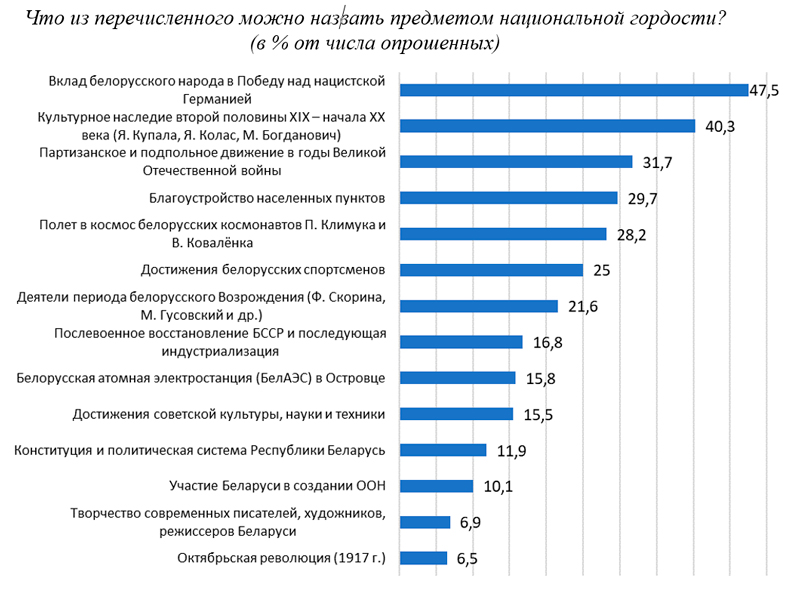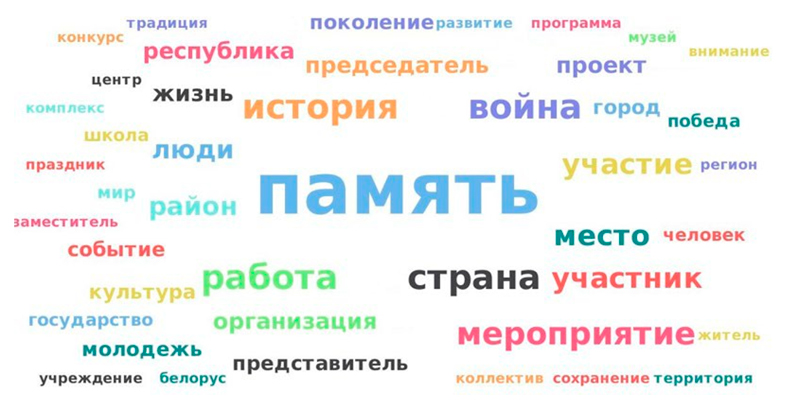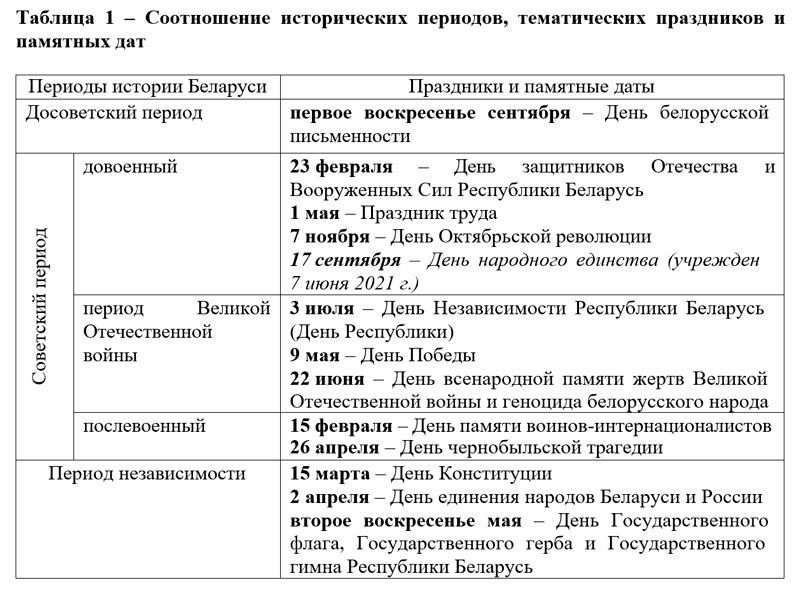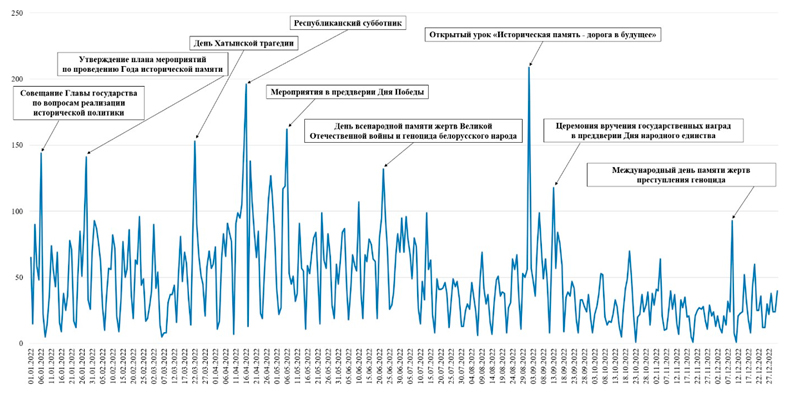In the context of the escalating intercivilizational confrontation, the problem of rethinking the concepts of state historical policy for their compliance with new realities, the ability to provide reliable opposition to challenges and threats in the political and information spheres is significantly actualized. The importance of the state historical policy itself is increasing, the main purpose of which is, first, to prevent attempts to purposefully distort historical events, the activities of socio–political structures and individual personalities to the detriment of historical and national identity, and, second, to ensure the semantic and goal-setting basis of state policy, its clear positioning, both inside and outside.
With reference to Russia and Belarus, the essence of the state historical policy is to retain and protect the memory of the past, to form an understanding of what is happening on its basis and to lay the fundamental foundations of the image of the future for new generations. And all this is in the context of an unprecedented clash with the aggressive "historical policy" of the collective West, based on values and heroics that often contradict the objective course of history.
A clear confirmation is the actively promoted in 2020 – 2021 trend of the glorification of the anti–communist "resistance movement" in the Eastern European countries. In fact, the state-forming ideology of Lithuania is based on the myth of the "struggle of the Lithuanian people against the Soviet occupation." Latvia is moving in the same paradigm, where in 2022 laying flowers at monuments to Soviet soldiers was equated with disrespect for "millions of people who died or suffered greatly from the communist regime of the USSR." In turn, Warsaw went even further in justifying geopolitical goals, stating the possibility of direct incorporation into Poland of a part of Ukraine that was once part of the Polish-Lithuanian Commonwealth.
Such examples determine that there is no alternative to the implementation by our allied countries of a consistent historical policy based not so much on opposition and confrontation as on a firm and historically grounded creative basis.
Following the experience of the Republic of Belarus, the state historical policy includes a number of integral elements.
First. Conducting large-scale research work to ensure the completeness of the source base regarding the phenomena and processes of national history, clarifying hypotheses.
As noted by the President of the Republic of Belarus Alexander Lukashenko at the patriotic forum "This is OUR history" on September 17, 2022, "politics has always dominated history. Therefore, the events of a century ago ... were so politicized that ... not only historians, but many others as well – political scientists, lawyers and civil servants – will have to figure it out".
In addition to the classical directions of scientific research of the fundamental foundations of historical memory (archaeological, local history, ethnographic, historiographical and others), sociological research aimed at studying the deep foundations of the historical memory of the population plays an important role. Today, the issues of historical memory are in the focus of attention of Belarusian sociologists and historians, which is confirmed by the publications of N.L.Myslivets, I.V.Lashuk, N.N.Sukhotsky, I.A.Valakhanovich, V.V.Starichenok, S.M.Aleynikova, N.A.Sosnovskaya, N.F.Denisova, N.M.Brovchuk and others. Sociological measurements make it possible to determine the most valuable events and episodes of national history for citizens, symbols and personalities that are most revered (Fig. 1).

Infometric studies based on the analysis of the information field using technical analytics tools are a relatively new tool for studying social and media factors that are important for the formation of relevant accents of state historical policy. In particular, the analytical and information system "Infometrica" (hereinafter – AIS "Infometrica") used by the Belarusian Institute of Strategic Research (hereinafter – BISR) at the request of the "Year of Historical Memory" gives a generally positive associative series ("tag cloud"), indicating the formation of a favorable media map of national history (Fig. 2).

Second.Objective and principled assessment of historical periods and processes, their impact on the historical memory of modern society, the code of the nation.
The integrity and continuity of historical memory is reflected in the calendar of state, national and other holidays, as well as memorable dates (hereinafter – holidays and memorable dates), which actually contains the history of Belarus in miniature and is an important tool for retaining and ensuring the continuity of historical memory. Indeed, the conditional overlay of holidays and memorable dates on the tape of the time of history makes it possible to classify them into those dedicated to the pre-Soviet, Soviet periods and the period of independence. In turn, the Soviet period immortalized in the holidays can be divided into pre-war, military and post-war (Table 1).

The new state holiday – National Unity Day (celebrated for the first time on September 17, 2021) – has become the next stage in the continuity of historical memory. The idea of a new holiday is not limited to the memory of one more anniversary of the reunification of Western Belarus and the BSSR, but has included other aspects of the history, culture, way of life of Belarusians, rooted in the depths of centuries.
The Great Patriotic War occupies a central place in historical memory, which is perceived by our citizens through the prism of the Great Victory and as the contribution of the Belarusian people to the common victory. This factor determines the importance of measures to uncover new, not fully studied pages of military history, including negative ones, which were not previously discussed due to diplomatic and other reasons. The criminal process initiated by the Prosecutor General's Office of the Republic of Belarus in April 2021 on the genocide of the Belarusian population during the Great Patriotic War and the post-war period was an adequate step amid Western attempts to revise the history of the Second World War. The initiative to thoroughly investigate the facts of information about the deaths of millions of Belarusians and other persons as a result of the atrocities of the German occupiers and their accomplices was actively taken up by the Belarusian society and was legally enshrined in the law "On the Genocide of the Belarusian people" adopted by the Belarusian Parliament.
Based on the results of the meetings of the Republican Council for Historical Policy held in 2022 and other events, a principled and objective assessment of individual periods in the history of the Belarusian statehood was given:
- The period of Belarus joining the Polish-Lithuanian Commonwealth is characterized by the period of occupation, when Belarusians were actually subjected to ethnocide by Polish magnates and gentry;
- the stage of the Belarusian lands being part of the Russian Empire is estimated as a period of national revival and completion of the formation of the Belarusian nation.
The crowning recognition of the significance of the historical policy of the state was the inclusion of Article 54 in the Constitution of the Republic of Belarus adopted at a national referendum on February 27, 2022: "Everyone is obliged to protect historical, cultural, spiritual heritage and other national values. Preserving the historical memory of the heroic past of the Belarusian people, patriotism is the duty of every citizen of the Republic of Belarus."
Third. Implementation of large-scale events and projects aimed at consolidating the basic concepts (ideologies) of historical memory, ensuring their continuity in generations.
The most important marker of implementing the state historical policy in modern conditions was the repeated reference to this topic in the theses of the speeches of the President of the Republic of Belarus (according to the AIS "Infometrica", at least 16 policy statements on the subject of historical policy were made in 2022), the Prime Minister, the leaders of both chambers of Parliament. The theme of historical memory was one of the key accents of the President's Messages to the Belarusian people and the National Assembly in 2022 and 2023.
A natural political decision that meets the challenges of the time was the announcement of 2022 as the Year of Historical Memory. Within the framework of this decision, a set of measures has been implemented aimed at uniting society on the basis of historical memory, as well as ensuring continuity in the generation of the foundations of state historical policy. In particular, in the field of science and education, the Concept of school historical education has been adopted, according to which the content of a new course for senior classes of general secondary education institutions is being developed – "The History of Belarus in the context of world history". The Concept of a cycle model of social and humanitarian disciplines for higher education institutions was approved and is implemented since September 1, 2022.
The analysis of the information field performed with the help of AIS "Infometrica" at the request of the "Year of Historical Memory" revealed a direct correlation of large-scale events held at the state level and increased media interest in historical topics, which confirms the importance of organizational and ideological support for the implementation of state historical policy. For example, during the periods of significant meetings, republican events and forums dedicated to historical memory (a meeting on historical policy, the Day of the Khatyn tragedy, events on the eve of Victory Day and other memorable dates, an open lesson held by the President of the Republic of Belarus "Historical memory is the road to the future", the celebration of National Unity Day and others), the number of unique news materials in the Belarusian information field reached from 130 to 200 per day (Fig. 3).

"Year of Historical Memory" (monitoring period: 01.01.-31.12.2022)
The events of the Year of Peace and Creation announced in 2023 have become a logical continuation of the theme of the Year of Historical Memory and are aimed at forming a careful attitude to history and culture, increasing responsibility for the future of the country.
The subject of historical politics cannot be only the state. This is a collective work of politicians, public figures, mass media, educators and teachers, parents responsible for transmitting the basic values of society to their children. The work of public organizations in this direction is important. A vivid example is the experience of the Belarusian Republican Youth Union in organizing youth construction projects at historical memory sites (in particular, during the reconstruction of the Khatyn Memorial Complex).
Fourth.Continuous analysis of the dynamics of risks and threats, current trends in the public consciousness in order to update the concepts of state historical policy and increase its effectiveness.
The conducted studies, including the BISR research "Risks of the formation of national-state identity in the context of the implementation of historical policy" (2020 – 2023) demonstrate that the state retains a strategic initiative in the preservation of historical memory and provides its effective protection from distortions and falsifications, destructive influence from the outside.
For example, today, the historical mission of Belarus is seen in acting as a guardian of undistorted East Slavic values, a "memory capsule" about the feat of the people during the Great Patriotic War, which is facilitated by the "partisan gene" of Belarusians who defended the right to people's lives and their own path of development.
Due to its geographical location, a constant challenge for Belarus is the need to resist the often opposing, and often aggressive, concepts of unfriendly states, which requires constant strengthening of arguments and calibration of the accents of state historical policy.
This problem requires a scrupulous scientific analysis of the dynamics of the ideologies of the countries surrounding Belarus in order to understand the vulnerabilities and gaps of their own ideologies in order to supplement them with updated concepts that contribute to strengthening the semantic accents of historical memory in an aggressive foreign policy environment.
For a more substantive analysis of the directions of improving the concepts of state historical policy, a decomposition model of historical memory is proposed, consisting of the following elements:
- the civilizational paradigm. The actual concept for Belarus is the belonging of Belarusians to the East Slavic world and the civilizational proximity of the fraternal peoples of Belarus and Russia. Possible areas of improvement are strengthening the union status with Russia through historically conditioned joint participation in Eurasian projects and integration initiatives with the CSTO, EAEU, SCO and others;
- self-perception. The current concept for Belarus is respect for the traditions and values of the people, which have been formed over the centuries and determine the current attitude of Belarusians. Possible areas of improvement are the awakening of new reserves of historical memory, including by "removing the seal of political correctness" from certain events and processes that were the case (a vivid example is the revelation of the truth about the genocide of the Belarusian people);
- attitude to other peoples. The current concept for Belarus is peacefulness and the friendly attitude towards other states and peoples, religious tolerance, rejection of ethnic, national, religious, party and other hostility, adherence to the principles of non–interference in the affairs of other states. The direction of improvement is the perception of the paradigm of peace as a value that can be protected only in alliance with friendly states and the implementation of a policy of containment of alien and hostile countries and cultures;
- assessment of your history. The current concept for Belarus is historical continuity, proceeding from the assessment of each historical period as an important stage in the development of the Belarusian statehood with its own problems, achievements, successes. The direction of improvement is a principled and objective assessment of all periods of the history of the Belarusian statehood, as well as their own interpretations of the most important historical events, including those affecting the memory policy of other states seeking to replace the historical memory of the Belarusian people.
- the quintessence of a country mission. The actual concept for Belarus is anti–fascism and peaceful creation, as a tribute to the recognition of the special significance of the contribution of the inhabitants of the BSSR to the Victory of the Soviet people over Nazism. The direction of improvement is the transition to the paradigm of defense and protection of values based on the repeated historical experience of the nation existence in unfavorable geopolitical conditions.
Therefore, the state historical policy is in constant dynamics due to both external conditions and the processes of sociocultural transformation of society accelerating due to the development of technologies. The effectiveness of the state historical policy depends on the ability of its subjects to catch and anticipate challenges and new circumstances, formulate necessary and effective messages to society, involve citizens in real projects to preserve and strengthen historical memory.

